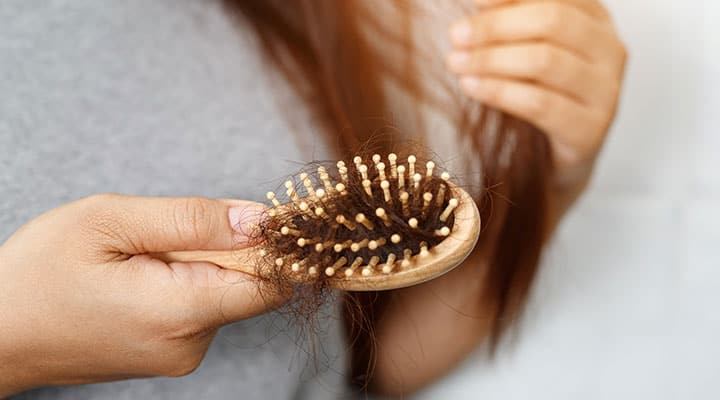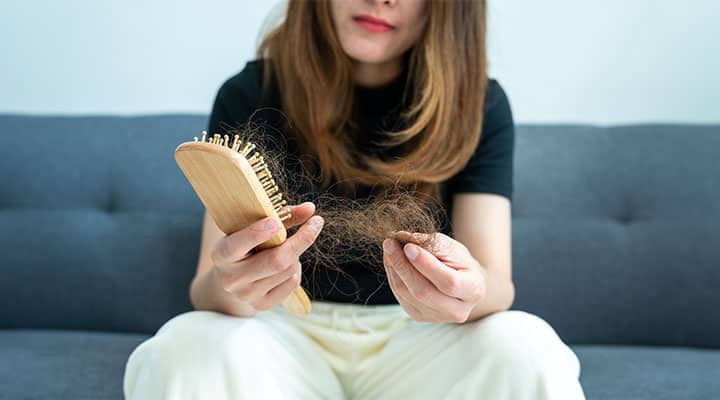
Are Genetics to Blame for My Hair Loss?
Published: April 2025
Picture this: You wake up one morning and look in the mirror, only to notice that your hair is a little thinner than it used to be.
When it comes to your hair, healthy, luxurious locks are the goal, right? And although some may be fortunate enough to be graced with a full, thick head of hair throughout their lifetimes, that's simply not the reality for most—especially as we age.
While many factors are involved in hair growth and structure, genetics play a significant role in both. Understanding more about your genetics and how they may affect your hair can help you better gauge your hair health as a whole.
So how do you untangle your genetic predisposition to baldness or hair loss? Enter lab testing. With a simple swab of your cheek, a hair loss lab test can identify the role your genes play in your hair, how they may be impacting hair loss and the best treatment options for restoring your hair to its former glory.
What causes hair loss?
Before we dive deep into genes, let's talk about the many different factors that can contribute to hair loss:
Hereditary causes
—Hereditary pattern baldness (the genetic type) is the most common type of hair loss and is often associated with both genetics and aging. This type of hair loss may start as early as your 20s and impacts the hair growth cycle, resulting in thinner, shorter hair that eventually stops growing over specific parts of the scalp.Significant stress
—In addition to androgenetic alopecia, telogen effluvium is a common cause of hair loss that can occur after an event causing significant stress to the body, such as:- Hospitalization or severe illness
- Pregnancy
- Malnutrition
- Rapid weight loss
- Iron deficiency anemia
- Vitamin D deficiency
- Thyroid disease
Autoimmune disorders
—Alopecia areata is an autoimmune disease that can occur as early as childhood and is characterized by focal hair loss.Mental health causes
—Hair loss can also be associated with trauma, such as tugging on the hair, or a mental health condition called trichotillomania (TTM) that's associated with compulsively pulling out one's hair.Medication
—Prescription medications that treat other medical conditions can cause hair loss, such as ringworm or frontal fibrosing alopecia.
Pro tip: You can take a blood test that measures biomarkers associated with medical causes of hair loss, including stress, hormone imbalances, anemia and more!
What genetic factors affect hair growth?
Let's back up a minute with a simple overview of genetics. At its simplest, a gene is a basic unit of inheritance passed from parents to their children. The information carried in your genes is coded in DNA used to make proteins. These gene codes (human DNA is made up of nearly 20,000 protein-coding genes alone!) play a different role in the body; some of them carry information the body uses to construct different physical traits.
Whether you got Aunt Barb's blue eyes on your mom's side or that cleft chin from your dad's genes is often pretty obvious from birth. Some attributes, like height, are mostly inherited from your parents' genetic influence, with a little help from your environment and nutrition.
But what about hair? Turns out, genes influence hair in a few ways:
Hair structure
—General strength and growth are among the many factors of your appearance influenced by your genes.Hair type
—Is your hair straight, wavy or curly? Thank your genetics for that one!Hair thickness
—Yep, you guessed it. Even the thickness of your individual hair strands is determined by genes.Hair color
—Hair color is influenced by multiple genes. They determine what types and how much melanin are present in your hair which, ultimately, determines the natural color of your hair.
Is hair loss genetic?
Indeed, it can be. With so many genetic factors influencing hair health, your genes are also involved in whether you lose your hair as you age; this applies to hair loss in both men and women.
One study revealed that around 80% of male-pattern baldness can be attributed to genetic factors. The genes involved are frequently associated with the androgen, or male hormone receptors, although the study identified more than 200 genes that could potentially be involved in male-pattern baldness.
That being said, the most common cause of hair loss in both men and women is androgenic alopecia. This condition (commonly known as progressive hair loss) can affect up to 80% of men and 50% of women in their lifetime. Androgenic alopecia is strongly associated with genetic and age-related factors, with a 2022 study showing a strong genetic connection, with hair loss especially common in twins.
Since there is such a strong correlation between your genetic makeup and hair loss, you might consider genetic testing. Not only could this kind of test help you identify key factors involved in your individual hair loss, but it can also help you and your healthcare provider determine the best treatment option if you're interested in hair regrowth. (More on those options in a bit!)
How do you know if your hair loss is genetic?
Since hair loss can be associated with the health conditions above (sometimes more than one!) it may have you wondering if your hair loss is genetic or based on something else.
Hereditary pattern baldness generally doesn't require any specific testing as it can be diagnosed based on the pattern of hair loss and a history of similar hair loss in the family, but DNA tests may help your healthcare provider identify unique variations in your genes that may be affecting both hair loss and growth.
What should you expect from a hair growth DNA test?
A hair growth DNA test should analyze specific genes that have been shown to be related to both hair loss and hair growth and give you more insight into personalized treatment recommendations that will be specific to your individual hair traits.
These tests may offer clarity about which solutions will be more effective for you, including medication and nutritional support. This type of testing may include questionnaires regarding lifestyle and other factors that may impact your overall hair health.
In some cases, the testing may include customized prescriptions you can take to your healthcare provider for potential sign-off if they determine those options are appropriate for you.
How to choose the best hair growth genetic test
With so many test options out there, choosing the right test for you can feel overwhelming. It's most important to look for a test with research and scientific evidence backing it. You'll also want to ensure the test addresses a variety of potential genes associated with hair loss and hair growth to ensure that you're getting more complete information and the best possible treatment options.
Pro tip: Need help better understanding your test results? Reach out to one of our Wellness Specialists to help review your options!
What are the best hair regrowth treatments?
There are many potential options for treating hair loss.
Over-the-counter treatments
—Some over-the-counter medications include minoxidil, which may stimulate hair growth and prevent further hair loss over 6-12 months when used as directed. The medication stops working if you stop using it, so adherence is important. Other solutions could include topical oils, ointments and shampoos specific to hair growth.At-home therapies
—Laser therapy and microneedling also show some benefits for hair loss, though you should check with a dermatologist prior to using this type of therapy to ensure it is safe for you.Dermatologist options
—Your dermatologist may be able to improve hair growth with options including steroid injections into the scalp, hair transplantation, laser therapy and platelet-rich plasma injections.Prescription medication
—Several topical and oral medication options may be prescribed. For example, finasteride treats male pattern hair loss, while spironolactone is often used in women with female pattern hair loss.Nutritional interventions
—In some cases, your provider may recommend specific nutritional therapy. This type of targeted nutritional therapy is generally recommended based on laboratory test results that demonstrate nutritional or vitamin deficiencies that could cause hair loss. It's also possible to get too much of a nutrient, so this type of nutritional therapy should be done with the guidance of your doctor.
So which one is best for you? This is why gene testing is so valuable! It can help recommend the best treatment to nourish and grow those luscious locks!
About the Author: Jillian Foglesong Stabile, MD, is dual board-certified in Family Medicine and Obesity Medicine. She has been in practice for more than 15 years in full-scope rural family medicine, including obstetrics. Dr. Foglesong Stabile received her medical degree from Wake Forest University School of Medicine and completed her residency at Family Medicine Spokane. She also holds the degree of Fellow of the American Academy of Family Physicians. Additionally, Dr. Foglesong Stabile completed a Master Preceptor Fellowship at Pacific Northwest University of Health Sciences, where she is a clinical faculty member.
References
- Adil A, et al. "The effectiveness of treatments for androgenetic alopecia: A systemic review and meta-analysis." Journal of the American Academy of Dermatology. April 2017. https://pubmed.ncbi.nlm.nih.gov/28396101/
- Alessandrini A, et al. "Common causes of hair loss – clinical manifestations, trichoscopy and therapy." Journal of the European Academy of Dermatology and Venereology. December 2020. https://onlinelibrary.wiley.com/doi/abs/10.1111/jdv.17079
- Bates SA. "Deoxyribonucleic Acid (DNA)." Genome.gov. April 2025. Genome.gov. https://www.genome.gov/genetics-glossary/Deoxyribonucleic-Acid-DNA
- Gokce N, et al. "An overview of the genetic aspects of hair loss and its connection with nutrition." J Prev Med Hyg. October 2022. https://pmc.ncbi.nlm.nih.gov/articles/PMC9710406/
- Green E. "Gene." Genome.gov. April 2025. https://www.genome.gov/genetics-glossary/Gene
- Hagenaars SP, et al. "Genetic prediction of male pattern baldness." PLoS Genetics. February 2017. https://pmc.ncbi.nlm.nih.gov/articles/PMC5308812/
- Institute for Quality and Efficiency in Health Care (IQWiG). "In brief: What is the structure of hair and how does it grow?" InformedHealth.org - NCBI Bookshelf. January 2023. https://www.ncbi.nlm.nih.gov/books/NBK546248/
- Walter K. "Common causes of hair loss." JAMA. August 2022. https://jamanetwork.com/journals/jama/fullarticle/2795266
- "Is hair color determined by genetics?" MedlinePlus Genetics. https://medlineplus.gov/genetics/understanding/traits/haircolor/
- "Is hair texture determined by genetics?" MedlinePlus Genetics. https://medlineplus.gov/genetics/understanding/traits/hairtexture/
- "Hair loss: Diagnosis and treatment." https://www.aad.org/public/diseases/hair-loss/treatment/diagnosis-treat
- "Hereditary-patterned baldness." Harvard Health. February 2024. https://www.health.harvard.edu/a_to_z/hereditary-patterned-baldness-a-to-z
Always be in the know!
Access the latest deals, wellness news, expert health tips & more!











